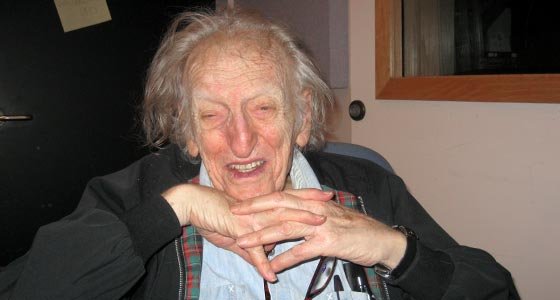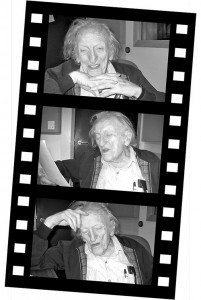 At 91, Charles Brin's philosophy comes through clearly, “I keep learning,” he said. “It’s very important to listen to what you have done. People always have to set goals and have a sense of their development. They have to prepare and train themselves.” (Photos by Jan Willms)[/caption]
At 91, Charles Brin's philosophy comes through clearly, “I keep learning,” he said. “It’s very important to listen to what you have done. People always have to set goals and have a sense of their development. They have to prepare and train themselves.” (Photos by Jan Willms)[/caption] By JAN WILLMS
Charles Brin is short in stature. But from that slight figure emerges a voice that can resonate across a room, a voice that can be full of timbre or as gentle as a running stream.
And since 1978, that voice has come across the airwaves of KFAI Fresh Radio, as Brin and his partner, Beryl Greenberg, read aloud some of the greatest short stories ever written.
Seward resident Brin, 91, was at KFAI, (1808 Riverside), at its beginning.
“It took about five years to get KFAI on the air,” Brin recalled. He said public radio claimed the new station was interfering with its signal, but KFAI prevailed and obtained its license.
A couple months after that, according to Brin, he and Greenberg started reading short stories. And although the length and days of the week for their show have changed over the years, they have kept it going.
It is currently called Tuesday’s Spoken Word and airs from 6:30-7pm on Tuesday nights on 106.7 FM in Minneapolis and 90.3 FM in Saint Paul.
“Beryl’s background has been at the U of M in molecular biology,” Brin said. “But she has become a full-fledged radio personality.”
 “KFAI is home,” Brin said. As the two read from Hemingway, Chekov, Carson McCullers, Stephen Crane and James Joyce, Brin’s background in theater and film is evident.
“KFAI is home,” Brin said. As the two read from Hemingway, Chekov, Carson McCullers, Stephen Crane and James Joyce, Brin’s background in theater and film is evident.
Born in Minneapolis, he remembers his first brush with the stage when he played the role of Robin Hood in a grade school play. He said he did quite a bit of radio work while he attended college at the University of Minnesota, and then he headed to New York for the New School for Social Research, a school that was renowned for its attitudes toward civic and social change.
Brin said many of the professors at the school had escaped from Nazi Germany to find a new life in the United States. It was there that he changed his major from psychology to psychodrama, studying under Jacob Marino, a Viennese psychiatrist. “He was literally the inventor of role play and psychodrama,” Brin said.
While in New York, Brin started appearing in off-Broadway plays. One he remembers well was “The Dubbuk,” a story of possession and exorcism.
“I had a great part, playing a holy, angelic messenger from heaven,” Brin said. The role won him an award as most promising supporting actor. For someone who had only been in about three plays in Minnesota, this was heady stuff. He was working off-Broadway with actors who had been placed on Joseph McCarthy’s blacklist and despite their talent, could not perform on Broadway.
However, the director of “Inherit the Wind” saw Brin perform, and he earned a part in the original Broadway play.
This gave him an opportunity to work with actors Tony Randall and Paul Muni, a character actor who had been a hero of Brin’s since he was a teenager and heard him on the radio.
Muni had been in a radio play, ‘The Life of Emile Zola.’ He gave a powerful speech as Zola, about prejudice and injustice. As a school assignment, Brin had to select a speech, memorize and present it. He chose Muni’s speech and won a National Forensic League contest with it.
In New York, he had the opportunity to work with Muni in “Inherit the Wind,” and as he got to know him, he became even more inspired. But then, his mother’s illness drew him back to Minneapolis, where he has stayed.
Brin used his study of psychodrama to join with some others and create the Minnesota Institute of Psychodrama. He taught classes in the field, and psychodrama was used by industry as well as social workers, to explore role play and role reversal.
This became Brin’s passion, but he used his creativity in other ways and continues to do so. He plays the violin, and he has started performing with a community orchestra in Fridley. He has had roles in films: “Grumpy Old Men” and the Coen brothers’ “A Serious Man.” He recently played Uncle Matty in Minnesota-made “Jingle Dress.” “I represented traditional values plus the need for change,” Brin said.
He currently is on the board of Screen Actors Guild-American Federation of Television and Radio Artists (SAG-AFTRA), a position he has held since 1973.
“I must admit the stage is very appealing when it works,” Brin said. “I have always been drawn to it. But for movies, the commitment is shorter.”
He said he worked on a recent film that, if accepted by the Sundance festival, could draw some attention.
“I continue to get rewards from doing that kind of work,” he said.
Brin said he believes that theater can be a great resource for personality development, at least in its initial phase. “There’s a little bit of narcissism, too,” he chuckled.
“Right now on Broadway, there is a great emphasis on musicals again,” he noted. “And in movies, it is terror and action. I think the thoughtful kinds of explorations are harder to come by.”
But he plans to keep his options open.
“I keep learning,” he said. For the radio program, he said that he and his partner do prepare for the program, giving them about three days to get ready. And they listen to their show.
“It’s very important to listen to what you have done,” Brin stated.
“People always have to set goals and have a sense of their development. They have to prepare and train themselves.”
Whether in psychodrama, music, acting or presenting radio broadcasts, Brin has followed this path—for a lifetime.
Comments
No comments on this item Please log in to comment by clicking here